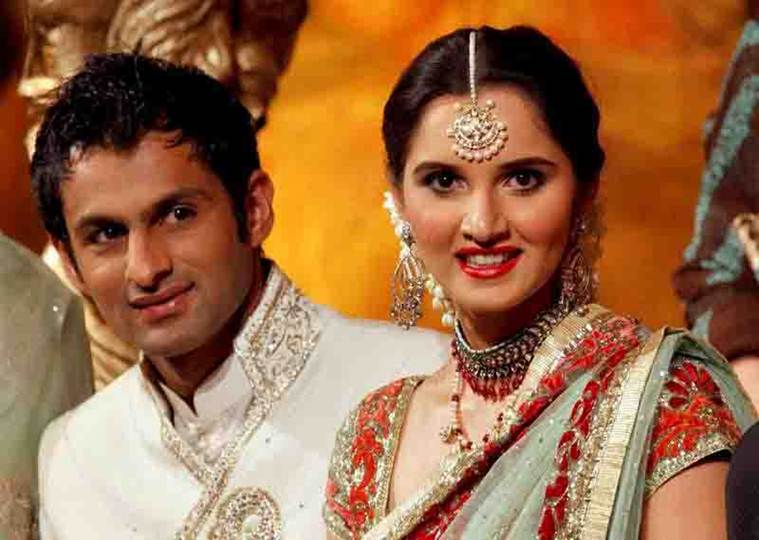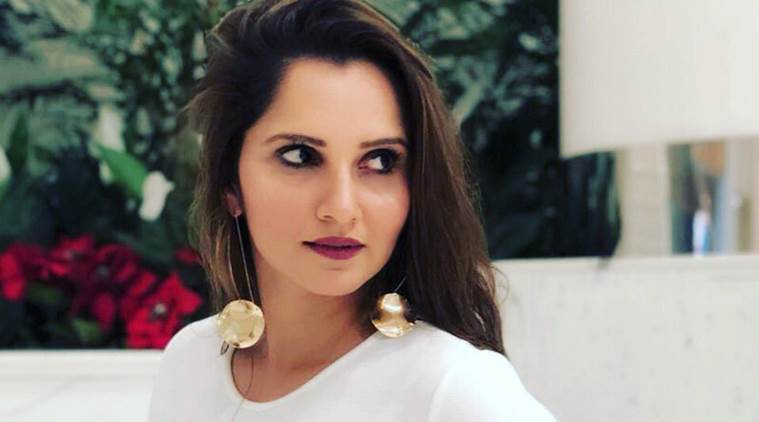The other day, in the middle of the night, I wanted glazed donuts and I couldn’t imagine why,” Sania Mirza sounds surprised even as she says it. You can trace a little bit of sadness, too, in her voice as she rues having lost her sweet tooth. “For the first time, I have a chance to eat without actually worrying about training and then this happens,” she says with suppressed laughter. “It’s unfortunate.”
From the time she was six, Mirza’s been on the road. At first, she and her father Imran crisscrossed around the country in their hatchback, looking for tournaments. As she climbed the ladder, she shuttled between airports, hotels and stadiums, living the glamorous-yet-lonely life of a tennis player. Now, suddenly, she’s had to stay put: Mirza is in the third trimester of her pregnancy. “For 30 years, you’ve been doing something else and you are doing something else now. But life’s all about moving forward so you have to beat the circumstances,” Mirza says.
The 31-year-old has been “beating the circumstances” from the time she picked up the racquet. She did that as a child, when relatives advised her against playing tennis because they thought she would “get a shade darker and then no one would marry her”; Or, as a teenager, when her style and confidence were often mistaken for arrogance; Or as a grown-up woman, whose basic freedom to choose a life partner was questioned.
But the circumstances she’s talking about now are different. In about a month, or less, Baby Mirza-Malik — as Mirza and her cricketer husband Shoaib Malik called their yet-to-be-born child in a tweet in April — is expected to be born. You ask her how she’s feeling about it and she pauses to think: “Anticipating,” she finally says. “I am not scared or anxious. Rather, I am anticipating a lot of changes in my life.”
 Sania Mirza is certain about one thing: she doesn’t want pictures of her child “all over the media.” (Courtesy: Sania Mirza)
Sania Mirza is certain about one thing: she doesn’t want pictures of her child “all over the media.” (Courtesy: Sania Mirza)
Mirza is at her Banjara Hills house in Hyderabad. She can’t recall the last time she’s spent so much time here “doing nothing”. There have been the odd injury breaks but, “even then, you are doing your rehab,” she adds. “Right now, I am having a lot of down time which I have never had.” Most of it has been spent understanding pregnancy quirks, like sleeping for eight straight hours and still waking up tired; or, getting more emotional than she can ever remember herself to be. There’s a new experience almost every day, but, largely, the last few months have been spent dealing with the “discomfort”. “I am getting more and more uncomfortable now. But that physical pain is nothing compared to the feeling that you’ll have when you have a child in your arms,” she says.
Mirza insists that hers has not been a stereotypical pregnancy. But then, it wouldn’t have been any other way with her. Since the time she popped into our lives in the mid-Noughts, Mirza’s been a liberator. A big-hitting, self-aware breaker of stereotypes with a dream so big, that it was refreshingly beautiful. Indian sport hadn’t seen anything like her.
At the Australian Open in 2005, her first major tournament, she didn’t bat an eyelid when she was thrown in the cage with Serena Williams, the superhero who had just started to demonstrate her wide-ranging powers. Instead, she carved out her own niche with her Popeye arms, that belted out fierce forehands and made rankings and reputations irrelevant. She spoke with poise and grace to the international media, but she never held herself back from speaking her mind.
 Sania Mirza with husband, Pakistani cricketer Shoaib Malik, at their wedding reception in Sialkot, Pakistan. (Courtesy: Sania Mirza)
Sania Mirza with husband, Pakistani cricketer Shoaib Malik, at their wedding reception in Sialkot, Pakistan. (Courtesy: Sania Mirza)
Mirza set herself free, and, in doing so, waymarked trails for the rest to follow. Now, she hopes to send that message across even during pregnancy. “It’s important to realise it’s just a part of your life, it empowers you,” she says. “I walk around 4 km every day, do yoga; I also played tennis for some time. It’s important to know that you are only pregnant, not ill. You don’t have to be in bed all day as long as you are keeping your baby safe,” she says.
As active sportspersons, who often lived in different time zones, the decision to plan a family wasn’t straightforward for Mirza and Malik. Malik has been trotting the globe, either with the Pakistan cricket team or as a T20 emissary, while Mirza was engaged in doubles duels in some corner of the world.
Whenever their schedule would permit, the couple spent time in Dubai — the neutral venue for their cross-border union. The call, however, was tougher for Mirza, in particular. She’d had a scarcely-believable run since 2015, winning 18 titles and reaching a dozen other finals that made her the undisputed best in women’s doubles. But her march was abruptly ended by a freak knee injury — jumper’s knee, caused by repetitive stress on the quadriceps tendon — last October.
She was advised complete rest for at least six months, and more time before she could return to tennis. Mirza announced her pregnancy in April. She says it “just felt like the right time” to have a child. “It is one thing to be ready for parenthood, but with our careers…there are so many things that went into us planning to have kids. If I was in a profession that did not require me to stop doing it, if I was doing any other job which didn’t involve any physical activity, I would’ve been working till the eighth month. However, being an athlete, you have to literally transform your body,” she says.
 The changes have been overwhelming. It’s been a phase of “self-discovery” for Mirza, who says she never imagined “her body can take so much”, that “it can create another human being!” she says with awe. It’s been a “healthy pregnancy” — there have been mood swings, but no undue stress; not much midnight cravings either. “Whenever I crave for something, I chill it out. I have tried to be as healthy as possible,” she says.
The changes have been overwhelming. It’s been a phase of “self-discovery” for Mirza, who says she never imagined “her body can take so much”, that “it can create another human being!” she says with awe. It’s been a “healthy pregnancy” — there have been mood swings, but no undue stress; not much midnight cravings either. “Whenever I crave for something, I chill it out. I have tried to be as healthy as possible,” she says.
Perhaps, the only thing she longs for is Malik’s company. The couple spent more time together at the beginning of her pregnancy. Malik made whistle-stop visits to Hyderabad and they frequently met in Dubai. But then, Malik’s non-stop tours with the national team began — Ireland, England, Zimbabwe, and now, UAE, where he is a part of Pakistan’s Asia Cup squad.
Malik describes this as one of the toughest parts of being an athlete. “I really miss being next to her during these precious times. I try to visit her even if I get a day’s break from my national duties,” Malik says, “Behind an athlete’s successful career lies many sacrifices, of which the toughest choice is not being able to give even time to family due to tours and training. Sania understands this better than I do, you can’t be World’s No. 1 otherwise, and she is coping with this phase of life very well.”
It’s been a little more than a month since Malik last saw Mirza. He is expected to make a quick dash after the Asia Cup. “I thought it would be a lot harder not having him around in the last couple of months but it’s been okay. He’s done whatever he could… taken a lot of long flights to meet me, even if it is for two days,” she says, “But my family has been around me. I have an uncle who comes down from Bangalore. I am really close to all these people. They made it quite easy. Obviously, having your husband around is special, but being an athlete myself, I know that playing and representing your country is crucial.”
 Sania Mirza with her family on Eid. (Courtesy: Sania Mirza)
Sania Mirza with her family on Eid. (Courtesy: Sania Mirza)
It’s something Mirza hopes to continue as well and join the growing list of superwomen who have made inspiring return to sports after motherhood. In 2013, Australian cricketer Sarah Elliott scored her maiden international century against England, while breastfeeding her son Sam during lunch and tea breaks; Jessica Ennis-Hill won the 2015 World Championships heptathlon gold just nine months after returning to full training following the birth of her son Reggie. Closer home, boxers Mary Kom and Sarita Devi were as combative in the boxing ring after childbirth as they were before that. At present, Serena Williams is the toast of the sporting world, showing that she hasn’t lost any of her prowess after having a baby.
Mirza says a comeback has been at the back of her mind, which has been one of the reasons she has “chilled out” her cravings. “I do plan to come back as soon as I can, but, right now, the only thing on my mind is to, inshallah, have a healthy baby,” she says.
There are some other things on her mind, too. “I have people coming up to me and saying, not directly, that ‘I hope and pray you have a boy.’ And I’m like, ‘Please don’t say that, just pray for a healthy kid.’ That’s an unequal world we are living in,” she says, her voice sounding anguished. She’s spent her entire career challenging gender inequality. Now, she has to to do that for her unborn child. The conversation veers towards equality in sport, which still remains a distant dream. The issue was magnified just recently, at the US Open finals, when Serena Williams accused umpire Carlos Ramos for treating her unfairly because she was a woman. You ask Mirza for her view on the issue, and, for once, she says she doesn’t have any. “She got angry, said a few things and that’s that. Everybody gets angry. Maybe, the timing was wrong, but you also have to give it to her for how she reacted after that. I don’t think it was personally against Naomi,” Mirza says. “I know Serena and she is not like that, she speaks for women’s rights and stands up for what’s correct. I just think she had a moment…it was just unfortunate, I don’t think so much needs to be said and done about it. Naomi won, and she deserves all the credit,” she says.

The general reaction to l’affaire Serena says a lot about the way women athletes are judged vis-a-vis their male counterparts in situations like these. Mirza, who has been working with the United Nations for women’s rights since November 2014, has experienced some of it herself. Sometimes, it had a religious tinge to it. Other times, it was personal. But almost always, it was because she was a woman.
In 2005, a cleric of the Sunni Ulema Board issued a fatwa against her for “wearing clothes on a tennis court that left nothing to (the) imagination.” The same year, after a match at the US Open, Mirza was asked by the media if she was trying to make a statement with the t-shirt she wore, that said: “Well behaved women rarely make history”. Mirza’s response was caustic: “I think I’ve said this enough, but, oh my god, this is the last time I’m going to wear a T-shirt in a press conference that says something!… I’m 18 years old. Give me a break. I’m just trying to have some fun here… I always say if I have to make a statement or say something, I can speak, I don’t have to wear it.” Similarly, before the 2012 Olympics, Mirza lashed out at the All India Tennis Association (AITA) for using her as “bait to try and pacify one of the disgruntled stalwarts of Indian tennis” — Leander Paes. Her emphatic response bruised several egos, but Mirza couldn’t care less. “I think women who are strong and opinionated are always labelled and called rebellious, etc. When a guy is opinionated, people say ‘Wow, he is so bold. He speaks his mind.’ That is, unfortunately, the world we live in,” she says.
Sexism in sports remains a touchy debate. This year, the French Open organisers changed their dress code for players after they found fault in Williams’s Black Panther-inspired catsuit — a full-length, skintight outfit that was designed to protect her against blood clots. Then, at the US Open, Alize Cornet became the talking point not because of a point she played, but because she chose to change her top on court. “The way a woman is judged,” Mirza says, “is not always based on her work. Many a times, it’s based on how she looks, what she’s wearing while a man is judged on his work. The fact that till today we have to justify why woman athletes need to be paid equally proves that sexism is everywhere. It’s about calling a spade a spade and I’ve done that many times,” she says.
Raising a child in an unequal world isn’t her only concern. How to protect her child from the prying eyes of the paparazzi is something that’s getting her worked up a little bit. She understands it’s the downside of fame. However, the manner in which Taimur — actors Kareena Kapoor Khan and Saif Ali Khan’s son — has been objectified “scares” her. “I can’t imagine what Kareena and Saif go through. The paparazzi is literally everywhere. It is a bit scary when you look at it like that,” she says.
Mirza is certain about one thing: she doesn’t want pictures of her child “all over the media.” Whether she’ll be able to manage it, she isn’t sure. “I understand the media is doing its job but there has to be some lines drawn. I don’t know if I will be able to find that balance but I will try my best not to have my child’s face all over the media,” she says.
For now, the only thing on her mind is to have a “healthy baby”. Mirza says she already feels maternal. “My instincts are changing. For example, small things like drinking spinach juice, which tastes really bad, I just have it because I think of my child. That’s what being a mother really is,” she says.(IE)


Comments are closed.